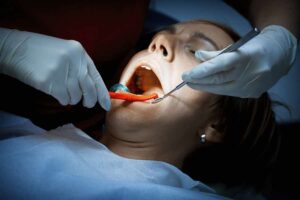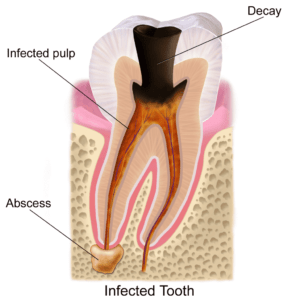- +917892951808
- Indiranagar, Bangalore
Best Dental Clinic In Bangalore Indiranagar | Best Dentist in Bangalore Indiranagar
- Home
- About Us
- Treatments
- Blog
- Contact Us
Dental Abscess – Causes, Treatment and Risk factors

Dental abscess is a pocket of pus that is associated with a particular tooth. It mostly forms around the root of an infected tooth. A dental abscess is also termed as dent alveolar abscess, tooth abscess or root abscess.
There are two common types of dental abscess:
 1. Incision: The abscess needs to be cut out and the pus needs to be drained out.
2. Treating periapical abscess: In order to treat a periapical abscess, root canal procedure will be used. A hole will be drilled into the dead tooth and the pus will be drained out. If there is any damaged tissue, that will be removed from the pulp. After this, a root filling is inserted into the hole to prevent subsequent infections.
3. Treating periodontal abscess: Once the abscess is drained and the periodontal pocket is cleaned, the dentist will use the scaling and planning method below the gum line to smoothen the surfaces of the root of the tooth. This will help the tooth prevent further infections. If the infection spreads, antibiotics will be prescribed.
1. Incision: The abscess needs to be cut out and the pus needs to be drained out.
2. Treating periapical abscess: In order to treat a periapical abscess, root canal procedure will be used. A hole will be drilled into the dead tooth and the pus will be drained out. If there is any damaged tissue, that will be removed from the pulp. After this, a root filling is inserted into the hole to prevent subsequent infections.
3. Treating periodontal abscess: Once the abscess is drained and the periodontal pocket is cleaned, the dentist will use the scaling and planning method below the gum line to smoothen the surfaces of the root of the tooth. This will help the tooth prevent further infections. If the infection spreads, antibiotics will be prescribed.
- Periapical abscess – forms at the tip of the tooth's root.
- Periodontal abscess – affects the bone next to the tooth.
Causes of Dental Abscess
A dental abscess is a complication of a dental infection in most cases. Often bacteria that is present in plaque, infects the tooth. Other causes are:- Gum disease, also known as periodontal disease
- A cracked tooth
- Poor oral hygiene
- Consuming sugary or starchy food/drinks which encourages growth of bacteria
- An injury caused to the tooth
- Previous tooth or gums surgery
- Certain underlying health conditions, such as diabetes, and those having treatment, including steroid medication, chemotherapy, etc.
Dental Abscess Symptoms
Signs and symptoms of a dental abscess include:- Sharp pain in the affected tooth that may come on suddenly and gradually worsen
- Pain that has spread to the jaw, ear, and neck
- Pain that's worse when lying down
- Sensitivity to hot or cold food and drinks
- An unpleasant taste in the mouth
- Difficulty in swallowing
Treatments for dental abscess
Dental abscesses are treated by removing the source of the infection and draining away the pus. Successful treatment of a dental abscess centers on the reduction and elimination of the offending organisms. This can include treatment with antibiotics and pus drainage. If the tooth can be restored, root canal therapy can be performed. Non-restorable teeth must be extracted, followed by curettage of all apical soft tissue. Here are a few treatments that are used: (Local anesthetic will usually be used to numb your mouth for these procedures.) 1. Incision: The abscess needs to be cut out and the pus needs to be drained out.
2. Treating periapical abscess: In order to treat a periapical abscess, root canal procedure will be used. A hole will be drilled into the dead tooth and the pus will be drained out. If there is any damaged tissue, that will be removed from the pulp. After this, a root filling is inserted into the hole to prevent subsequent infections.
3. Treating periodontal abscess: Once the abscess is drained and the periodontal pocket is cleaned, the dentist will use the scaling and planning method below the gum line to smoothen the surfaces of the root of the tooth. This will help the tooth prevent further infections. If the infection spreads, antibiotics will be prescribed.
1. Incision: The abscess needs to be cut out and the pus needs to be drained out.
2. Treating periapical abscess: In order to treat a periapical abscess, root canal procedure will be used. A hole will be drilled into the dead tooth and the pus will be drained out. If there is any damaged tissue, that will be removed from the pulp. After this, a root filling is inserted into the hole to prevent subsequent infections.
3. Treating periodontal abscess: Once the abscess is drained and the periodontal pocket is cleaned, the dentist will use the scaling and planning method below the gum line to smoothen the surfaces of the root of the tooth. This will help the tooth prevent further infections. If the infection spreads, antibiotics will be prescribed.
Preventing dental abscesses
Reduce your risk of developing dental abscesses by keeping your teeth and gums as healthy as possible. To do this, you should:- Floss and brush at least once a day to clean between your teeth and under the gum line
- Use a good fluoride toothpaste to brush your teeth twice a day at least for 2 minutes each time
- Cut down on sugary and starchy food and drinks
- Keep a regular check on your oral health by visiting your dentist regularly

